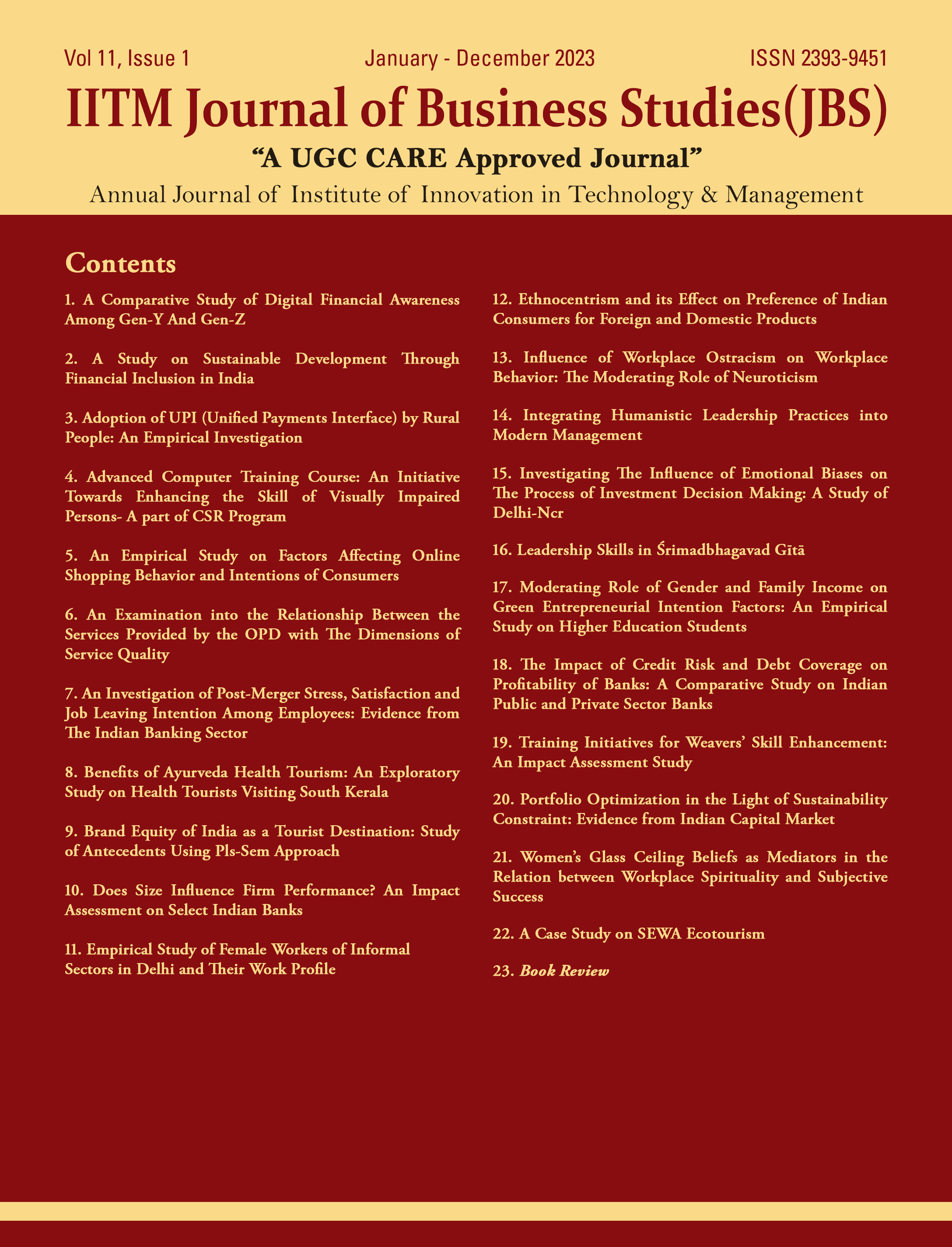A STUDY ON FACTORS RESTRICTING PURCHASE OF GREEN PRODUCTS
Keywords:
green products, environmental issues, FMCG products, Inefficacy of green products and speciousness regarding advertisements claimsAbstract
In spite of consumers’ awareness and consciousness regarding environmental issues, there is a lack of purchase of green products by consumers. They are showing concern for environment; but they are not purchasing green products. There are various factors which negatively affect the purchase of green products by consumers. So this study was conducted with an objective to explore the factors restricting rural consumers to buy green FMCG products. For this purpose data were collected from 200 respondents. By applying factor analysis; ten factors were explored regarding restricting the rural consumers to buy green FMCG products. These factors include Lack of knowledge and promotion; Uncaring Behaviour; Inefficacy of green products; Negative attitude and speciousness regarding advertisements claims; Negligence towards green products; Ambiguity in claims and cost factor; lack of promotional incentives and quality; Self-inefficacy and lack of belief; Ineffective labeling and Complex exercise.
References
Barbarossa, C. and Pastore, A. (2015), “Why environmentally conscious consumers do not purchase green products: A cognitive mapping approach”, Qualitative Market Research: An International Journal, Vol. 18, No. 2, pp. 188-209.
Carrete, L., Castaño, R., Felix, R., Centeno, E. and González, E. (2012), “Green consumer behavior in an emerging economy: confusion, credibility, and compatibility”, Journal of Consumer Marketing, Vol. 29, No. 7, pp. 470-481.
Chaudhary, R. (2018), “Green buying behavior in India: an empirical analysis”, Journal of Global Responsibility, Vol. 9, No. 2, pp. 179-192.
Chen, Y.S. and Chang, C.H. (2013), “Greenwash and Green Trust: The Mediation Effects of Green Consumer Confusion and Green Perceived Risk”, Journal of Business Ethics, Vol.114, No. 3, pp. 489-500.
http://www.ecolabelindex.com/ecolabels/?st=subject,companies
http://www.isustainableearth.com/green-products/what-is-a-green-product 7. http://www.tei.or.th/carbonreductionlabel/pr/150209-FTI-Global-Trend-Eco-market.pdf 8. https://www.businesswire.com/news/home/20210322005061/en/GreenPrint-Survey-Finds
Consumers-Want-to-Buy-Eco-Friendly-Products-but-Don%E2%80%99t-Know-How-to Identify-Them https://www.circularonline.co.uk/news/consumers-demand-greener-products-in wake-of-pandemic/ https://www.conserve-energy-future.com/25-green-eco-friendly-products. php
https://www.ecofriendlyhabits.com/eco-friendly-stats/
Hughner, R.S., Mcdonagh, P., Prothero, A., Shultz, C.J. and Stanton, J. (2007), “Who are organic food consumers? A compilation and review of why people purchase organic food”, Journal of Consumer Behaviour, Vol. 6, Nos 2-3, pp. 94-110.
Ishawini and Datta, S.K. (2011), “Pro-environmental concerns influencing green buying: a study on Indian consumers”, International Journal of Business and Management, Vol. 6, pp. 124-133. 12. Johnstone, M.L. and Tan, L.P. (2015), “An exploration of environmentally-conscious consumers and the reasons why they do not buy green products”, Marketing Intelligence & Planning, Vol. 33, No. 5, pp. 804-825.
Junior, S.B., Martínez, M.P., Correa, C.M., Moura-Leite, R.C. and Silva, D.D. (2019), “Greenwashing effect, attitudes, and beliefs in green consumption”, RAUSP Management Journal, Vol. 54, No. 2, pp. 226-241.
Kautish, P. and Sharma, R. (2018), “Study on relationships among terminal and instrumental values, environmental consciousness and behavioral intentions for green products”, Journal of Indian Business Research, https://doi.org/10.1108/JIBR-01-2018-0013
Lin, J., Lobo, A. and Leckie, C. (2017), “Green brand benefits and their influence on brand loyalty”, Marketing Intelligence & Planning, Vol. 35, No. 3, pp. 425-440. 16. Megavannan, R., Arivazhagan, R., and Name, G. (2019), “A Study on Green Products Buying Decision among Chennai People with respect to their Ecological Consciousness and Challenges to Buy”, International Journal of Recent Technology and Engineering, Vol. 8, No. 2, pp. 137-141. 17. Nguyen, T.N., Phan, T.T.H., Cao, T.K., Nguyen, H.V. (2017), “Green purchase behavior: mitigating barriers in developing countries”, Strategic Direction, Vol. 33, No. 8, pp. 4-6. 18. Ogiemwonyi, O., Harun, A.B., Othman, B.A., Ismael, D.A. and Ali, R. (2019), “Key Issues and Challenges of Green Consumer in Consuming Green Product an Insight from the emerging country: Malaysia”, International Journal of Psychosocial Rehabilitation, Vol. 23, No. 2, pp. 514-528.
Sondhi, N. (2014), “Assessing the organic potential of urban Indian consumers”, British Food Journal, Vol. 116, No. 12, pp. 1864-1878.
Woo, E. and Kim, Y.G. (2019), “Consumer attitudes and buying behavior for green food products: From the aspect of green perceived value (GPV)”, British Food Journal, https://doi. org/10.1108/BFJ-01-2018-0027
Zavali, M. and Theodoropoulou, H. (2018), “Investigating determinants of green consumption: evidence from Greece”, Social Responsibility Journal, Vol. 14, No. 4, pp. 719-736.

